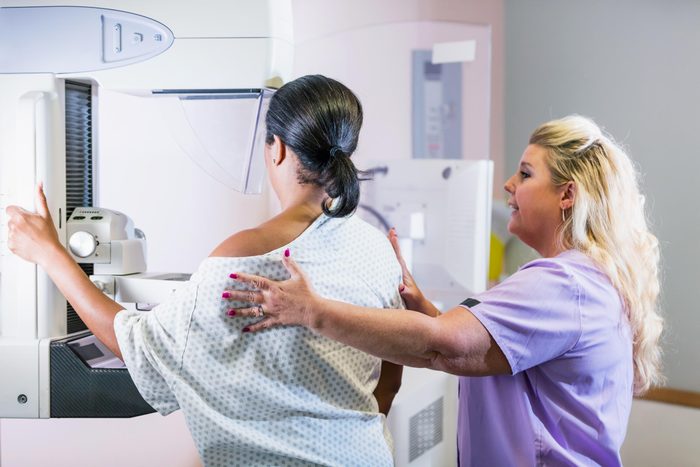Doctors Share What to Know About the New Changes for Breast Cancer Screenings
Updated: May 23, 2023

A prominent US panel says women should start getting screened for breast cancer 10 years earlier than their previous recommendation.
Despite impressive improvements in the detection and treatment of breast cancer, the number of invasive cases diagnosed each year in the US impacting women in their 40s has been gradually increasing since 2015. Data show that African-American women are 40% more likely to die from breast cancer than are Caucasian women—a grim statistic that has not improved much over time.
With these facts in mind, the U.S. Preventive Services Task Force (USPSTF), a highly influential panel whose recommendations are often adopted by American agencies, recently released a draft statement with new breast cancer screening guidelines.
The FDA Just Released a New Requirement for Mammograms
What did USPSTF say about breast cancer screening?
The panel recommends that women of all ethnic and racial backgrounds begin receiving mammograms every-other year starting at age 40. The panel previously raised their recommended starting age for biannual mammogram screening to 50 back in 2009, and encouraged women in their 40s make a decision with their clinician on whether they should start screening based on their individual needs and preferences—but now they suggest all women start being screened at 40. (It’s important to note that these new recommendations do not apply to certain groups of women, such as those who have previously had breast cancer or who received high doses of radiation to their chest at a young age.)
Speaking about the new draft statement, Carol Mangione, MD, the Task Force’s immediate past chair, said the new advice is a positive step forward, telling MedPage Today: “If we could get all women screened who were eligible in our country, this change in our recommendation would reduce mortality from breast cancer by about 20%.”
This new draft statement’s advice isn’t overly surprising, given that other authoritative agencies and societies already recommend women receive annual mammograms beginning at age 40, including the Society of Breast Imaging (SBI) and the American College of Radiology (ACR). Currently, the American Cancer Society’s advice is a bit less clear, recommending that women be offered the chance to receive annual mammograms starting at age 40, and begin getting annual mammograms at age 45.
Here’s Who Is at Greatest Risk for Developing Cancer from Drinking Alcohol
What’s next?
While this new draft statement may represent a step in the right direction, not every agency is impressed with the new recommended guidelines. Debra Monticciolo, MD, a member of the SBI’s board of directors, told Medpage Today that she was unpleased with the panel’s statement, claiming they should be recommending women receive mammograms annually, not biannually.
Monticciolo explained that based on modeling, annual screening for women aged 40 to 79 equates to a median 41.7% reduction in breast cancer deaths, whereas biennial screening strategies for women aged 40 to 74 equates to breast cancer mortality reductions of 30% and 28.4%, respectively. Representatives with the USPSTF claimed that models do estimate that annual screening may help reduce rates of breast cancer mortality, they also show that annual screening increases the risk of false positives and misdiagnosed cases by 50%.
Regardless of which guidelines are most effective, what remains obvious is the benefit of mammograms. In a 2020 study published in the journal Cancer, researchers found that Swedish women who underwent mammograms were 41% less likely to die from breast cancer within 10 years.
While the USPSTF draft statement is based on extensive research, its advice is not set in stone just yet. Members of the public can review their statement and supporting research and submit comments from May 9th to June 5th, 2023.
- What Is Medical Gaslighting? 9 Doctors’ Statements That Are Major Red Flags
- Thousands of COVID Tests Have Just Been Recalled by the FDA
- New Research Says This “Healthy” Tea May Actually Cause Liver Damage
- The U.S. Surgeon General Just Announced a Loneliness Epidemic
This article was updated for clarity on May 23, 2023.















